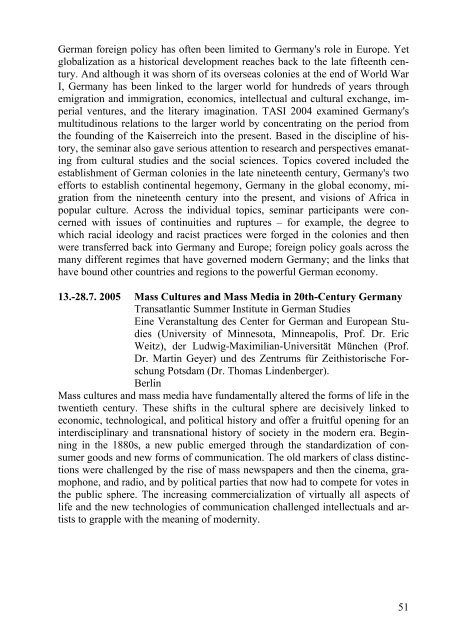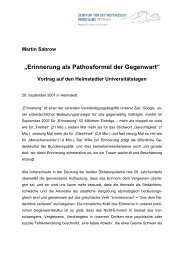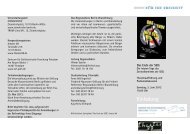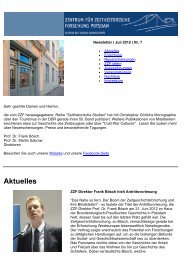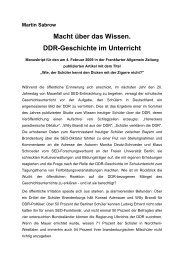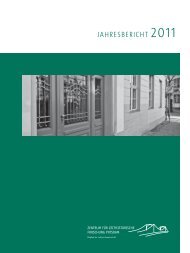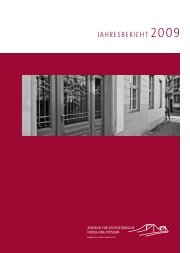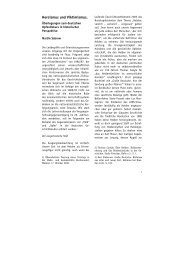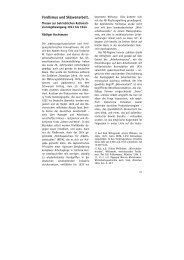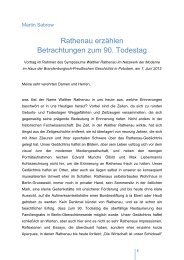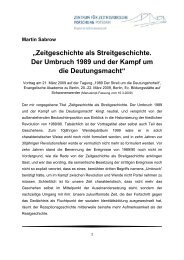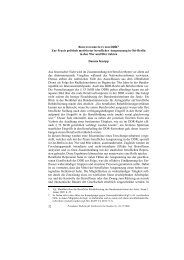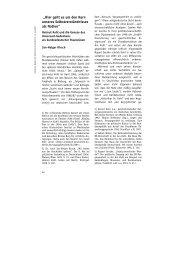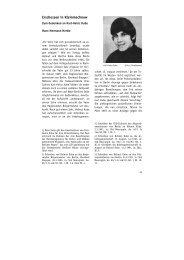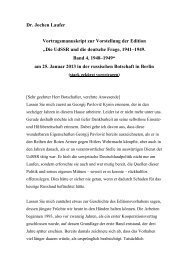Tätigkeitsbericht 2004-05 (PDF) - Zentrum für Zeithistorische ...
Tätigkeitsbericht 2004-05 (PDF) - Zentrum für Zeithistorische ...
Tätigkeitsbericht 2004-05 (PDF) - Zentrum für Zeithistorische ...
Erfolgreiche ePaper selbst erstellen
Machen Sie aus Ihren PDF Publikationen ein blätterbares Flipbook mit unserer einzigartigen Google optimierten e-Paper Software.
German foreign policy has often been limited to Germany's role in Europe. Yet<br />
globalization as a historical development reaches back to the late fifteenth century.<br />
And although it was shorn of its overseas colonies at the end of World War<br />
I, Germany has been linked to the larger world for hundreds of years through<br />
emigration and immigration, economics, intellectual and cultural exchange, imperial<br />
ventures, and the literary imagination. TASI <strong>2004</strong> examined Germany's<br />
multitudinous relations to the larger world by concentrating on the period from<br />
the founding of the Kaiserreich into the present. Based in the discipline of history,<br />
the seminar also gave serious attention to research and perspectives emanating<br />
from cultural studies and the social sciences. Topics covered included the<br />
establishment of German colonies in the late nineteenth century, Germany's two<br />
efforts to establish continental hegemony, Germany in the global economy, migration<br />
from the nineteenth century into the present, and visions of Africa in<br />
popular culture. Across the individual topics, seminar participants were concerned<br />
with issues of continuities and ruptures – for example, the degree to<br />
which racial ideology and racist practices were forged in the colonies and then<br />
were transferred back into Germany and Europe; foreign policy goals across the<br />
many different regimes that have governed modern Germany; and the links that<br />
have bound other countries and regions to the powerful German economy.<br />
13.-28.7. 20<strong>05</strong> Mass Cultures and Mass Media in 20th-Century Germany<br />
Transatlantic Summer Institute in German Studies<br />
Eine Veranstaltung des Center for German and European Studies<br />
(University of Minnesota, Minneapolis, Prof. Dr. Eric<br />
Weitz), der Ludwig-Maximilian-Universität München (Prof.<br />
Dr. Martin Geyer) und des <strong>Zentrum</strong>s <strong>für</strong> <strong>Zeithistorische</strong> Forschung<br />
Potsdam (Dr. Thomas Lindenberger).<br />
Berlin<br />
Mass cultures and mass media have fundamentally altered the forms of life in the<br />
twentieth century. These shifts in the cultural sphere are decisively linked to<br />
economic, technological, and political history and offer a fruitful opening for an<br />
interdisciplinary and transnational history of society in the modern era. Beginning<br />
in the 1880s, a new public emerged through the standardization of consumer<br />
goods and new forms of communication. The old markers of class distinctions<br />
were challenged by the rise of mass newspapers and then the cinema, gramophone,<br />
and radio, and by political parties that now had to compete for votes in<br />
the public sphere. The increasing commercialization of virtually all aspects of<br />
life and the new technologies of communication challenged intellectuals and artists<br />
to grapple with the meaning of modernity.<br />
51


